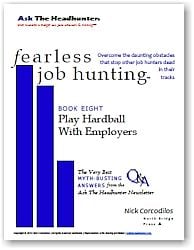In the January 31, 2017 Ask The Headhunter Newsletter, a reader can’t negotiate a higher job salary — but learns how to get more money.
Question
I rejected three job offers from three companies because none of them would budge on the salary. With unemployment dropping, the labor force is tighter, and employers say they can’t get good hires. It’s obvious why. They won’t pay enough! There must be a way to negotiate more money in a market like this. You must know some tricks. What can I do next time?
 Nick’s Reply
Nick’s Reply
You’ve answered your own question. When you can’t negotiate a higher salary in the job offer, ask for more money!
HR departments act like salaries are still set in stone while, as you point out, HR also says unemployment is at record lows. We can debate how big the unemployment number really is — loads of talented people are still on the street and many have dropped out of the market altogether, making it seem like everyone who wants to work is already working. (Jobs plentiful! Pay is up! But, how are you doing?) But forget all that. What matters here is HR. And HR says the talent market is very tight.
Nonetheless, HR in many companies won’t shake money loose to boost salaries so it can hire who it needs. That’s how you can leverage more money.
When the salary offer is on the table
When a company makes you a job offer and won’t budge if you try to negotiate higher, you need to understand what makes HR tick. Someone somewhere in the company created a salary scale for every job. Forget what the job is actually worth in the market — probably a lot more, and in time, we might see these salary scales adjust to reality. For now, many companies are stuck. They’re just not going to offer you more salary than the scale permits.
So don’t ask for more salary. Ask for more money. You should do this only under three conditions:
- The employer has already made a specific salary offer and will not budge when you try to negotiate.
- You really like and want this job.
- You’re really going to walk away from the job offer if the employer won’t give you more money.
That last item is key. Really being ready to walk away actually makes you a very powerful negotiator. It frees you to be creative. (So does positioning yourself properly to begin with. See Fearless Job Hunting, Book 6: Be The Profitable Hire.)
Give the employer what it wants
Try this.
How to Say It
“I understand that you won’t raise the salary for this job, and I accept that. But I know I’m worth more, and I can get it elsewhere. But I want to work here, with you, at this job. We’re at an impasse, but I think we can get over it while respecting both our positions.”
Now do something that will give you a huge edge in this negotiation. Give the employer what it wants. That’s right: Accept the job.
How to Say It
“The main thing I want to say is, I want to come work for you — and I accept the job.”
Then pause and say nothing.
What job seekers don’t realize is that every employer that wants to hire you is worried you’re going to reject the job. It’s worried you don’t really want the job, you’re not sure you want to work at the company, you’re not sure about the manager, maybe you don’t like the work space, the building, the people… The employer has no idea how to convince you. Every employer that wants to hire you is worried you’re going to say no.
So say it out loud. Make the commitment and put the company’s worries to rest. Tell them you accept the job.
Negotiate the terms
Whatever their response, say this next:
How to Say It
“I’m ready to start work. As long as we can come to agreement on the terms.”
Now, don’t try this if you are at all hesitant about anything other than the money. You must be ready to show up at this place to work for this manager, with these people, doing this job. You must be ready to start work now.
If the terms can be worked out.
Ask for more money: A signing bonus
Now deliver the key to everyone’s happiness.
How to Say It
“I know you have a salary scale that you can’t break. I’m not asking you to break it. I’m not going to ask for more salary. But I am worth more money. So I’d like to propose terms that will not affect the salary you’ve offered. I accept the salary. But I’d also like to propose terms that will still pay me what I’m worth. I’d like to propose a one-time signing bonus of $X. It will not affect my salary, or anything based on it, like future raises, 401(k) contributions, insurance, or anything that is tied to salary. I accept the salary of $N that you offered if you will include a one-time signing bonus of $X.”
Why it works
Will this work? Who knows. It’s a gambit to try only if you’re willing to walk away otherwise. It’s a way to save a deal. I hate to say no to a deal I’ve already worked hard for — so I ask myself what I’ll settle for that won’t hurt the other guy, and I try to say, Yes to what you want, if you’ll do X for me. If you won’t, I’ll walk away, no harm done.
Here’s why a signing bonus can work. The lovely thing about it is, it doesn’t break the salary range. The company is not paying you more than it planned. But it has to pay you what you’re worth. You just have to set $X reasonably, and that requires some compromise on your part if you really want the job.
(If the employer whips out a salary survey, taps it, and says you’re not worth any more, I hope you read this first: Beat The Salary Surveys: Get a higher offer.)
Keep in mind that, if the employer agrees, your future raises will be based on your salary. If the raise is 3%, it’ll be 3% of your salary, not your salary plus the bonus. The same goes for all other benefits based on salary. You’ll see that bonus just one time. So plan accordingly.
(Worried the employer might withdraw its non-negotiable offer because you dared ask for something more? Read The Bad-Business Job Offer: Negotiating not allowed! Like we already discussed, you must be ready to walk away.)
Do you want this much more money?
What’s the point of a one-time payment, you ask, if what you really want and deserve is a higher salary? The point is that — as we noted at the beginning — you’re going to walk away from this job offer anyway. This is better than the offer you rejected — assuming you really want the job. This is more money. If there’s no size of signing bonus that would make you happy, then don’t even ask for it.
But if you can’t negotiate a higher salary, and what you want is more money, then negotiate for more money. A signing bonus is a good way to do it.
A few gotchas to beware of
You didn’t think there were no gotchas, did you?
- Signing bonuses always come with a catch. You may have to agree to stay for a certain period of time, or refund the bonus or some pro-rated part of it. Negotiate an acceptable period.
- Signing bonuses are sometimes paid in parts, to avoid having you skip out with the money. It might be monthly for a year, or quarterly or twice over a year. Negotiate it. My preference is to get it all upon start date, especially if there’s a refund clause.
- Signing bonuses usually come with a written agreement. Consider having an attorney review it — along with your written job offer and other terms.
- Signing bonuses are usually taxed just like any other pay. Consult your accountant if necessary.
- The company may like your idea — but not the amount of the bonus. Decide well in advance what you’ll accept, and stick to it.
What kind of money is there other than salary? Would a signing bonus make a difference to you? How big? Have you ever gotten a signing bonus? How would you advise this reader?
: :


 To Employers:
To Employers: My new employer wants me to list in my LinkedIn profile that I’m working for her, and to include the company’s logo, but I’m still in the 90-day probationary period of my new business development job. I don’t want other employers to see it yet. She’s made no commitment to me, and besides, I still don’t have the private office or company phone she promised.
My new employer wants me to list in my LinkedIn profile that I’m working for her, and to include the company’s logo, but I’m still in the 90-day probationary period of my new business development job. I don’t want other employers to see it yet. She’s made no commitment to me, and besides, I still don’t have the private office or company phone she promised. I think it sucks. Would the employer let you do your food shopping during your work day?
I think it sucks. Would the employer let you do your food shopping during your work day? During my Christmas break, the news kept coming hot and heavy from the U.S. Department of Labor and associated pundits and experts: You should stop complaining about jobs and salaries. Everything’s great!
During my Christmas break, the news kept coming hot and heavy from the U.S. Department of Labor and associated pundits and experts: You should stop complaining about jobs and salaries. Everything’s great!








 I have been out of the corporate world for over 10 years. I recently sold my business and am contemplating my options. I am too young to retire (in my mid-50s), yet too old to be a hot prospect for most companies, so I am networking.
I have been out of the corporate world for over 10 years. I recently sold my business and am contemplating my options. I am too young to retire (in my mid-50s), yet too old to be a hot prospect for most companies, so I am networking. The best elevator pitch I’ve ever heard goes like this: “By doing XYZ, I can increase your profitability by 10%.” There’s the focus you mentioned — but to bring that kind of focus, you must first clearly see and examine the object. And that object is my business. Can you hack my business? (See
The best elevator pitch I’ve ever heard goes like this: “By doing XYZ, I can increase your profitability by 10%.” There’s the focus you mentioned — but to bring that kind of focus, you must first clearly see and examine the object. And that object is my business. Can you hack my business? (See  As a senior manager with a big manufacturing company, I lead a sizable sales team and have enjoyed good career growth over 18 years. I’ve been told I am a high-potential employee and they are considering me for a promotion to a director job at HQ or in one of our national regions, which would require a relocation. I’m ready to move, but I won’t do it without a considerable salary increase.
As a senior manager with a big manufacturing company, I lead a sizable sales team and have enjoyed good career growth over 18 years. I’ve been told I am a high-potential employee and they are considering me for a promotion to a director job at HQ or in one of our national regions, which would require a relocation. I’m ready to move, but I won’t do it without a considerable salary increase. Nick’s Quick Advice
Nick’s Quick Advice